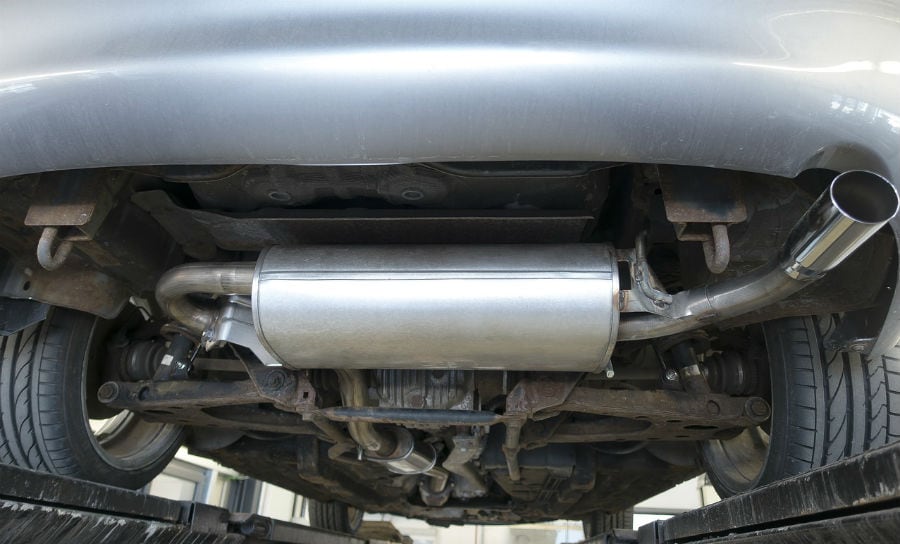As an engine runs, it pushes the exhaust gases out through the exhaust valves into the exhaust manifold and down through the exhaust to the muffler. The muffler quiets the exhaust noise and creates some resistance to airflow in the process.
This means that the exhaust system upstream of the muffler must hold some amount of back pressure. Any leak tends to be noisy as the un-muffled pressurized exhaust gases escape.
Though, if a leak is small, it is usually most pronounced at startup when the air flow hasn’t been established yet. Revving the engine also causes higher exhaust system pressures and can make leaks easier to find.
Cost of Repair in the Exhaust System
The estimated exhaust leak repair costs on common vehicles using $100 an hour as a labor rate are as follows:
For a 2011 Chrysler 200 with a 2.4-liter engine, the labor time to replace a muffler and intermediate pipe assembly with tailpipe (all a one-piece assembly from the factory) is estimated at 0.5 of an hour. A factory exhaust assembly costs about $575, and a Walker two-piece replacement costs about $140. The total cost to complete the job would be about $625 using OE parts, or about $190 using aftermarket parts.
This vehicle has a flange gasket on one end of the catalytic converter, with a labor time of around 0.5 of an hour to replace. A factory gasket costs about $12, and an AP gasket costs about $5. The total cost for the job would be about $62 using factory parts, or about $55 using aftermarket parts.
For a 1998 Chevrolet K1500 with a 5.7-liter engine, the labor time to replace the muffler and tailpipe assembly is around 0.5 of an hour. A factory part costs about $863, and an aftermarket three-piece AP Emissions replacement costs about $152. The total cost to complete the job would be about $913 using factory parts, or about $202 using aftermarket parts.
The K1500 exhaust system has a center dual-pipe flange gasket which involves about 0.5 of an hour to replace. A Mahle gasket costs about $10, costing the job about $60. There are also two gaskets connecting the y-pipe to the exhaust manifolds; one a donut-style ring and the other a flat gasket. The labor time to replace them would be around 0.9 of an hour, and a Fel-pro gasket set costs about $8, for a total of $98 to complete the job.
For a 2006 Toyota Corolla with a 1.6-liter engine, the labor time to replace the muffler and tailpipe assembly is around 0.4 of an hour. A factory part costs about $417, and an Ansa replacement part costs about $88. This makes the cost to fix exhaust leak about $457 using factory parts, or about $128 using aftermarket parts.
The Corolla has a donut-style gasket at the junction of the front pipe to the exhaust manifold which costs about $9 for a Mahle part and takes about 0.5 of an hour to replace. The job would cost around $59.
There is an intermediate pipe with a resonator that runs from the catalytic converter to the muffler pipe and costs about $64 for an AP Emissions part. The labor time to replace it would be around 0.7 of an hour, costing the job about $139 to finish.
In all cases, there would be likely additional charges for hardware, as the old hardware is often damaged and not re-useable.
Exhaust Leak Repair
Exhaust leaks can cause problems with the engine management systems. The PCM relies on accurate information from the O2 sensors to calculate fuel mixtures, and an exhaust leak can introduce air into the stream and feed the PCM bad information.
Exhaust leaks can also make it appear to the PCM that the catalytic converter is working poorly or that the engine is running too lean; triggering an engine light in either case.
A leaking tailpipe won’t usually cause any noticeable noise, but it’s still a problem. Any exhaust gases that gather underneath the vehicle rather than exiting the perimeter can build up and leak into the cabin, which is a dangerous problem.

Different Parts That Can Leak
Exhaust Manifold and Exhaust Manifold Gasket. Exhaust gasses exiting the cylinder head go first to the exhaust manifold which is sealed to the cylinder head by a gasket. The gasket can deteriorate and fail. Exhaust manifolds can leak if they develop cracks, or when they warp; allowing gasses past the gasket.
Exhaust Flex Pipe. On a transverse engine, there will usually be a flex pipe built into the system downstream of the exhaust manifold. This is to allow for the rotational movements of the engine under starting and acceleration forces. This has an accordion pipe section with a steel braided wire covering, and it can crack internally and leak.
Exhaust Flange Gaskets. Exhaust system pipes are usually connected by flange gaskets, at the exhaust manifold, and then, downstream at the catalytic converter. A leak at the catalytic converter or other exhaust system components will usually be a flange gasket leak.
Seals can be conventional flat gaskets or metal o-rings that seal flat flanges or donut-style gaskets that can accommodate some imprecision in their mounting angle. Replacement is generally pretty straightforward, though, the exhaust hardware is always prone to rust issues, heat damage, and breakage.
Muffler. The muffler is located near the end of the exhaust system under the vehicle and is very prone to failure due to rust and sometimes, road damage. Exhaust gases contain moisture that condenses within the exhaust system and tends to collect in the muffler. There is usually a weep hole to allow this to escape, but a muffler can still rust out from the inside.
Most mufflers attach with a bolt-on flange and are fairly easy to replace, but some use a sleeve fitment and exhaust clamps. In the latter case, it’s often necessary to use specialized exhaust tools to replace the muffler or fit a tailpipe without damage.
Other Ways of Completing Repairs
The above estimates are for direct-fit parts and using factory time for labor. That’s a good guide for what to expect at a dealership or general service shop, but an exhaust specialty shop may be significantly different.
An exhaust shop, which often has the equipment and expertise to fabricate an exhaust system from scratch, usually has the flexibility to look at exhaust system repairs differently. Simple gasket replacements will likely be very similar. But if a pipe is leaking or damaged, for instance, a new section of pipe can usually be bent to match and welded in fairly cheaply.
If sourcing mufflers or tailpipes is difficult for a vehicle, a universal muffler or pipe can usually be made to match the original. Sometimes minor leaks can be welded up without replacing parts.
For most things, it’s not possible to get an estimate for an exhaust repair from a shop without having them look at the vehicle. However, that is something to keep in mind.

